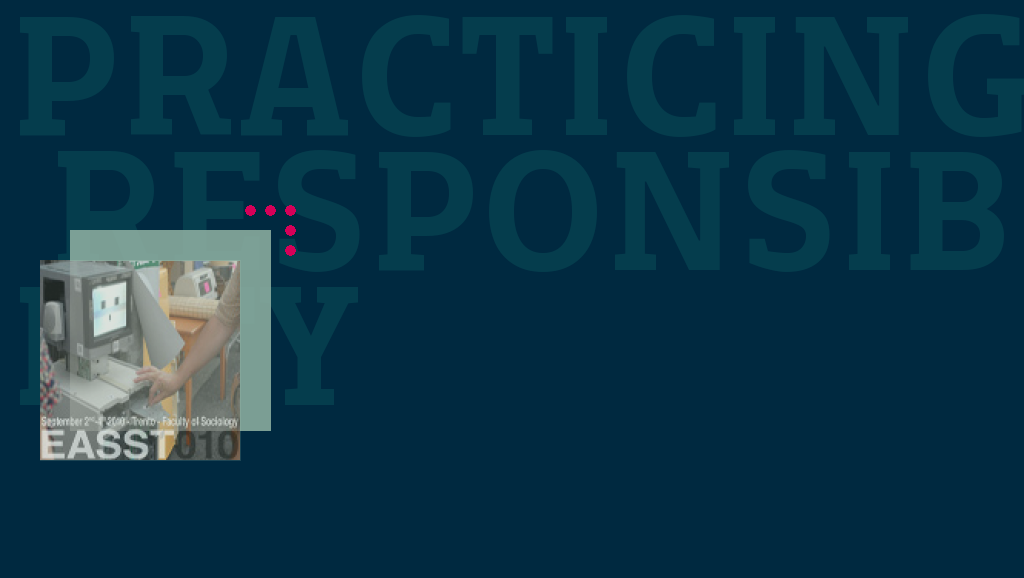Nell’imminenza della deadline (prorogata al 22 marzo) per proporre comunicazioni scientifiche, segnalo il seguente call for papers su "politica, policies e governance della scienza", co-organizzato dalla Fondazione Bassetti, nell’ambito della conferenza EASST_010 (European Association for the Study of Science and Technology) che si terrà a Trento il 2-4 settembre in collaborazione con STS Italia. Si possono presentare abstracts direttamente tramite il sito web della conferenza.
Politics, Research Policies, and Governance of Science and Technology: Practicing Responsibility? (workshop and thematic track n. 32)
Convenors: Cristina Grasseni, Luca Guzzetti and Giuseppe Pellegrini
All over the world innovation policies – in education, science, technology, research and industrial development – are more and more considered as a crucial element in the economic competitiveness of nations and of transnational regions like the EU. Although few nations spend 3% or more of their GNP in research (the unattained target of the Lisbon strategy for 2010), these investments are almost universally considered as important economic multipliers and great attention is devoted to institutions and enterprises devoted to R&D.
After 2001 public spending in defence has been growing; this is especially true for the US, but a new attention to security research has been developing on both side of the Atlantic, and elsewhere. New questions have been asked about the civilian spin-offs of military research, about the growing importance of civilian-origin technologies, and about dual technologies as important elements in innovation policies.
In the meantime, social movements of different origin – environmentalist, human rights, women, patients associations, etc. – have been challenging the neutrality of the innovation system. These groups have asked for a larger space for discussion and for a participation of the civil society to decision-making in S&T research. Science and technoscientific expertise have been put in question as far as their ethical, social and cultural legitimacy is concerned. The deconstruction of the notion of "expert" has meant that political decisions about technoscience should not be delegated to the so called neutral "experts". How can we take account of the disagreement between experts or between different disciplines, as well as of the uncertainties in science communication? How may these and other factors intervene in the identification of thresholds of "socially acceptable" risks? How can we take into account the different answers to these questions by different social groups?
Innovation, by definition, includes an element of risk. On the other hand, audit cultures have introduced, in scientific practice and elsewhere, "risk management" as a cognitive attitude and a planning tool. Which kind of case studies and methods within science, technology and innovation studies have explored responsibility and innovation jointly? Do (and how) "innovators" (a subject in need of definition…) take upon themselves the consequences that innovation brings about in history? Our initial questions could be summed up thus: How can we envisage responsible scenarios of innovation? Which politics of culture can increase sensibility towards the responsibility of innovation? Would this be advisable? Where can we locate practical performances of critical analysis in the contexts of scientific practice today?
What is the governance of technoscientific innovation? How is it communicated, implemented and who are the possible subjects and scenarios for responsibility in it? Which institutional policies currently claim to respond to this need, and how do they measure responsibility? What are the epistemological and political outcomes of such practice?
Keywords:
Innovation policies
Old and new forms of governance in research policy
History of science and technology
Power and knowledge
Military research and dual technologies
Technoscientific expertise and democracy
Risk and Responsibility
Cristina Grasseni (M.Phil. History and Philosophy of Science, Ph.D. Social Anthropology) lectures Social Anthropology at the University of Bergamo and is scientific advisor of the Fondazione Giannino Bassetti for responsible innovation. Amongst her publications: Skilled Visions. Between Apprenticeship and Standards (ed.), Oxford, Berghahn, 2007, Developing Skill, Developing Vision. Practices of Locality at the Feet of the Alps (Oxford, Berghahn, 2009).
Luca Guzzetti (Ph.D. Political Sciences) teaches Sociology of communication and Sociology of Politics at the University of Genoa (Italy). His current research focuses on European research policies, military technologies and communication in politics. He has been President of STS-Italy (2008-2009). In the STS field he has published three books: La frode scientifica, History of European S&T Cooperation, and A Brief History of European Union Research Policy.
Giuseppe Pellegrini (Ph.D. Sociology) teaches Methodology of social research at the University of Padua, Italy. His current research focuses on social policy, citizenship rights and public participation with specific regard to biotechnology issues. He is the coordinator of the research area “Science and Citizens" at Observa – Science in Society. He is a member of the EASST (European Association for the Study of Science and Technology) and of the Society for Social Studies of Science (4S). His last book published is Technoscientific Innovation. Responsibility and New Models of Democracy in Science and Society Relationship (2005).
















